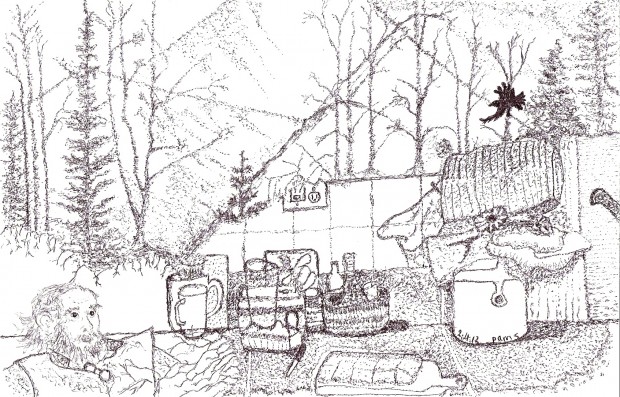
Here it is: the first drawing of a series of fifteen drawings. The commitment is to do one drawing a week.My assignment is to find the mystical in the ordinary.
Regarding the effect of the drawing process on my inner state: After spending several hours drawing, I am aware of my breathing as it gently washes around and through my entire body. I feel that the substance that I breathe extends beyond me and connects me to a larger world of which I am a part. It is very calming and I am in a state of peace.
1. I hearken back to this quote, which is on the first page of my book of drawings On the Way to Cushendall:
Peace mounts to the heavens, the heavens descend to earth, earth lies under the heavens, everyone is strong.
–Victory Song of the Morrigan, Book of Fermoy
2. I also find inspiration in a story from the Kikuyu people of South Africa, which Laura Simms has retold in her book Our Secret Territory: The Essence of Storytelling (http://www.laurasimms.com/marketplace/).
Here is the story in a nutshell:
There was a farmer who cared for his cows as if they were his children. One day, for no apparent reason, they gave no milk. So he took them to greener pastures. Still they gave no milk. The third night he spent the night in the field with them and he discovered what was going on! Three beautiful sky maidens slid down a rope with calabashes and milked the cows. He was so astounded by their beauty he forgot the milk entirely and he grabbed one of them. The other two escaped, but he held on to the struggling third. She would not stop struggling until he said, “I want to marry you!” Then she stopped struggling. She said she would marry him if he promised that he would never look into her finely woven basket until she gave him permission. He agreed and they were married. She was a good wife and even took care of the cows. But the farmer’s curiosity grew until he could not contain himself. One day he looked into the basket. There was nothing there. He laughed out loud! When she returned she asked him what he did that day. He boldly confessed that he had opened the basket. Quietly she asked him what he saw in there. Boldly he said, NOTHING!!!!!!!!! “Oh, you saw nothing. But everything is in the basket, all the beautiful things of the sky for you and me. If you had waited, I would have taught you how to see. Now I must go.” The woman from the sky took her basket and went back to the sky.
The Kikuyu storyteller added, “It is the same today; mankind still thinks the things of the spirit are empty.”
3. Speaking of the Void (the state of the formless Absolute):
for Charles Simic
Always so late in the day
In their rumpled clothes, sitting
Around a table lit by a single bulb,
The great forgetters were hard at work.
They tilted their heads to one side, closing their eyes.
Then a house disappeared, and a man in his yard
With all his flowers in a row.
The great forgetters wrinkled their brows.
Then Florida went and San Francisco
Where tugs and barges leave
Small gleaming scars across the Bay.
One of the great forgetters struck a match.
Gone were the harps of beaded lights
That vault the rivers of New York.
Another filled his glass
And that was it for crowds at evening
Under sulfur-yellow streetlamps coming on.
And afterward Bulgaria was gone, and then Japan.
“Where will it stop?” one of them said.
“Such difficult work, pursuing the fate
Of everything known,” said another.
“Down to the last stone,” said a third,
“And only the zero of perfection
Left for the imagination.” And gone
Were North and South America,
And gone as well the moon.
Another yawned, another gazed at the window:
No grass, no trees…
The blaze of promise everywhere.
4. Mahasunya, the Great Void, is a transcendent state in which the subject has merged with the object. (The Doctrine of Vibration, Mark S.G. Dyczkowski)
5. All of creation, and the vibrational sounds associated with it, exist in the vast silence of mahasunya, the Great Void. It is from this silence that they will emerge into boisterous activity. (The Splendor of Recognition, Swami Shantananda)
6. When I was a child, an impression (I can’t say it was a thought, as it was not a creation of the intellect) came to me time and again– usually at night after I had been tucked into bed– that the world may not really exist. The child’s mind was puzzled; there was nothing that could be done with it. I never spoke of it to anyone. I’d forget it, and it would come back after weeks or months had passed– and again leave me in it’s wake, feeling something ineffable.
7. When I was a child, I could walk to my Grandma’s house. There was always a place for me in her kitchen. I sat on the step stool next to the stove and watched Grandma cook. Sometimes we talked, but it was the kind of talking with spaces in between. The spaces weren’t thought-filled ones where each of us disappeared into our own worlds. The spaces were characterized by a sense of togetherness. There was an unspoken bond. Grandma had a quick and irreverent sense of humor, and if I had mentioned this to her later in life she would have made some kind of quip. But it is becoming more and more apparent to me that Grandma and I had something deeply in common that defied words– a deep and profound silence of communion.